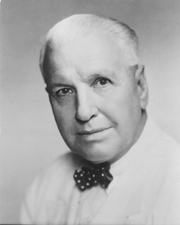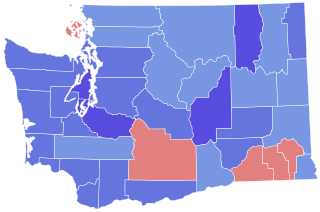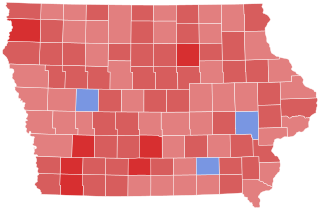
Otha Donner Wearin was an American writer and politician. Elected as the youngest member of President Franklin D. Roosevelt's first "New Deal" Congress, his political career stalled in 1938 when he gave up his seat in the United States House of Representatives at Roosevelt's urging to run for a U.S. Senate seat held by another Democrat, Guy Gillette, but primary voters rallied behind Gillette. He became a prolific writer, which led to his election to the Cowboy Hall of Fame.

Clyde LaVerne Herring, an American Democratic politician who served as the 26th governor of Iowa, and then one of its U.S. senators, during the last part of the Great Depression and the first part of World War II.

Guy Mark Gillette was an American politician serving as a Democratic U.S. Representative and Senator from Iowa. In the U.S. Senate, Gillette was elected, re-elected, defeated, elected again, and defeated again.

Richard Louis Murphy of Dubuque, Iowa was a Democratic U.S. Senator from Iowa. Elected with President Franklin D. Roosevelt in 1932, as only the second Democratic Senator from Iowa elected since 1852, Murphy's service was cut short by his accidental death in 1936, with over two years remaining in his only term.

Thomas Ellsworth Martin was an American politician who served as a United States representative and Senator from Iowa. Martin, a Republican, served in Congress for 22 consecutive years, from January 1939 to January 1961.

Lester Jesse Dickinson was a Republican United States Representative and Senator from Iowa. He was, in the words of Time magazine, "a big, friendly, white-thatched Iowa lawyer." In early 1936, he dreamed of winning the presidency. However, the only race he would enter that year would be for his own seat in the Senate which he lost.

Lloyd Thurston was a seven-term Republican U.S. Representative from southern Iowa. First elected in 1924, he served until 1938, when he unsuccessfully sought election to the U.S. Senate. By his final term, he had served on three of the most powerful House committees.

The 1948 United States Senate election in Iowa took place on November 2, 1948. Incumbent Republican Senator George A. Wilson ran for re-election to a second term but was defeated by Democratic former Senator Guy Gillette.

The 1950 United States Senate election in Iowa took place on November 7, 1950. Incumbent Republican Senator Bourke B. Hickenlooper was re-elected to a second term in office over Democratic U.S. Undersecretary of Agriculture Albert J. Loveland.

The 1944 United States Senate election in Iowa took place on November 7, 1944. Incumbent Democratic Senator Guy M. Gillette ran for a second full term in office but was defeated by Republican Governor Bourke B. Hickenlooper.

The 1930 United States Senate election in Iowa took place on November 4, 1930. Incumbent Democratic Senator Daniel F. Steck ran for re-election to a full term in office, but was defeated by U.S. Representative Lester J. Dickinson.

The 1936 United States Senate Special Election within the State of Iowa occurred on November 3, 1936, following the death of incumbent Senator Richard Louis Murphy in an automobile accident. Representative Guy Mark Gillette (D-IA) and Editor of the Chariton Herald-Patriot, Berry F. Halden(R-IA) were the two major party contenders in this election. George F. Buresh (FL-IA) and two other candidates also ran. The result of this election was Gillette beating out both other candidates, and winning with 52% of the votes cast.

The 1936 United States Senate election in Iowa took place on November 3, 1936. Incumbent Republican Senator Lester J. Dickinson ran for re-election to a second term but was defeated by Democratic Governor Clyde Herring.

The 1938 United States Senate election in Washington was held on November 8, 1938. Incumbent Democratic U.S. Senator Homer Bone was re-elected to a second term in office over Republican Ewing D. Colvin.

The 1940 United States Senate election in Minnesota took place on November 5, 1940. Incumbent U.S. Senator Henrik Shipstead defected to the Republican Party of Minnesota from the Farmer–Labor Party of Minnesota, and defeated former Governor Elmer Benson of the Farmer–Labor Party and John E. Regan of the Minnesota Democratic Party to win a fourth term.

The 1954 United States Senate election in Iowa took place on November 2, 1954. Incumbent Democratic Senator Guy Gillette ran for re-election to a second term but was defeated by Republican U.S. Representative Thomas E. Martin.
A Massachusetts general election was held on November 2, 1954 in the Commonwealth of Massachusetts.

The 1952 Iowa gubernatorial election was held on November 4, 1952. Incumbent Republican William S. Beardsley defeated Democratic nominee Herschel C. Loveless with 51.90% of the vote.

The 1950 Iowa gubernatorial election was held on November 7, 1950. Incumbent Republican William S. Beardsley defeated Democratic nominee Lester S. Gillette with 59.10% of the vote.

Elections were held in Illinois on Tuesday, November 5, 1940.



















